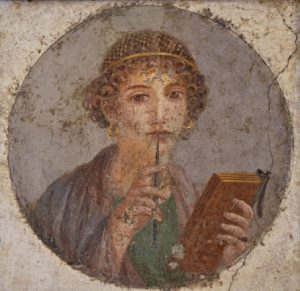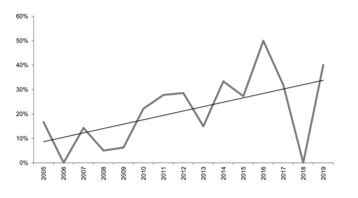Dr James Lloyd, Classicist in Residence at WHS, looks at the relevance of Classics in a modern world.
Education, both at school and at university, is about inspiring inquisitive minds, preparing the next generation to challenge the last, and equipping students with the skills to question the world they live in and to ask how they can make it better. But how do you distill such qualities into something that can be graded and assessed, condensed into a factor measured for league tables? What I mean to say by this, is that the case for Classics can be a difficult one to make. That being said, there are four key areas that make Classics a particularly important subject in today’s modern world.
Educational values
For me, Classics is a subject where the core elements of modern education can be championed. It is a subject whose topics range from discussions of love and religion, to critiques of imperialism and the myriad emotions of Greek tragedy. You need to be inquisitive to understand the context of the Odyssey, because, despite the similarities, the world of 700 BCE is very different to our own.
What Classics offers us is the time and space in which to reflect, an environment where ideas can be challenged. The questions posed by writers such as Homer, Sappho, Ovid, and Cicero are just as relevant now as they were the 2,000 years and more ago when they were first composed. This is not to place such writers on a plinth, like all too many museums do with looted statues, but to question the legacy of such writers, and what their purpose is in a largely more just and socially kinder world. As Dan Addis, also of Wimbledon, has recently argued, empathy is a key component of education, and here, Classics ranks highly.[1]

Classics is not an island
Or if it is, it is an island among an archipelago. Classics is not just the learning of Latin and ancient Greek. It can range from ancient economics and classical archaeology, to heritage and museum studies. In my case, it involves the study of iconography, material objects, inscriptions, and even ancient musical instruments. I have curated my own exhibition, and collaborated on the materials analysis of ancient religious offerings using pXRF and Pb isotope analysis.
The case for Classics is not an exclusionary one. It is a subject that works in conversation with many others. For example, a recent study published in the journal Reading and Writing has shown how learning Latin can help with English language acquisition.[2] The benefits of Classics can be found in other subjects too. History, Anthropology, Literature, Modern Languages, Architecture, and Law are just some of the areas in deep conversation with Classics. For example, studying the Aeneid helps us to be critical of the influences between politics and the arts today, and exploring the emotions of Sappho and the context of Ovid’s Art of Love help us to better understand contemporary issues of gender and sexuality.
Contemporary Concerns
Like any subject with a centuries’ long heritage, Classics was built on foundations that need to be rebuilt. This is the third point in my case for Classics.
In a recent open article on gender bias in one of the leading academic Classics journals, the Journal of Roman Studies, the editorial board found no evidence of gender bias in the acceptance of articles, but admitted that there was still much to be done in addressing the reasons as to why fewer women submitted work to the journal than their male colleagues.[3]

George Eliot would have doubtless responded to such a report with mixed feelings, given Latin and Greek were known to her Dorothea Brooke in Middlemarch as “those provinces of masculine knowledge… a standing-ground from which all truth could be seen more truly”.
That being said, the last two decades have seen a wave of feminist retellings of Classical stories, from Margaret Atwood’s Penelopiad to Madeline Miller’s Circe. The success of these books lies not just in the skill of their authors, but also in the urgency of their messages, a challenge to traditionally male-dominated narratives. While Classics has been taught in Britain for centuries, the way that we teach authors such as Homer and Sappho to students at Wimbledon is certainly very different to the way such texts were taught even 50 years ago.
Indeed, one of the most refreshing aspects of teaching at Wimbledon High School so far has been the breadth of learning and creativity shown by the girls, whether that is in discussing the role of Medusa in Myth and Monsters Club, and how it subverts ideas of beauty and power, or in exploring what ancient views of divinity reveal about universal human concerns, to use just two examples.
Classics outside the Classroom
To use just two examples. One of the problems with making the case for Classics is that there are very few empirical studies on the benefits of studying it. One of the likely reasons for this is that it is a relatively specialised subject. In 2019, provisional data recorded 3,575 GCSE entries for Classical subjects; for A-Level entries, the provisional figure is 4,995.[4] This can make the case for Classics difficult.
In an ideal world, students should study Classics because they will enjoy it, but this is not an ideal world, it is a difficult world. Employers will want to know what transferable skills you can demonstrate; being able to quote Homer normally isn’t one of them. In a society asking for an increasingly digitally literate workforce, when a decision must be made between, for example, learning to code and learning past participles, it seems difficult to justify choosing the participles.
But Classics does not just teach students the patience and perseverance to learn complex grammars and vocabularies, it is a subject that encourages a healthy dose of skepticism. Not just of the traditional narratives that it asks us to engage with, but of how arguments and ideas are constructed more broadly. Not only that, but it teaches us an understanding of different cultures. These are the exact kind of soft skills that Google were surprised to find were most vital for its employees, when it conducted research into its employment processes.[5]
To return to the title of this piece, what is the case for Classics? For me, Classics has taught me a way of viewing the world with a healthy dose of skepticism and kindness. And in a world where things are more uncertain than they have been for some time, it is something of a comfort that Classics can help us to make some sense of it all.
[1] Addis, 2019.
[2] Crasson et al. 2018
[3] Kelly et al. 2019
[4] Ofqual, 2019.
[5] Harrel & Barbato, 2018
References:
Addis, D. (2019). WimTeach. http://whs-blogs.co.uk/teaching/empathy-important-thing-can-teach-students/
Amy C. Crosson, Margaret G. McKeown, Debra W. Moore, Feifei Ye. Extending the bounds of morphology instruction: teaching Latin roots facilitates academic word learning for English Learner adolescents. Reading and Writing, 2018; DOI: 10.1007/s11145-018-9885-y
Harrell, M & Barbato, L. (2018). Google, Re:Work. https://rework.withgoogle.com/blog/the-evolution-of-project-oxygen/
Kelly, C., Thonemann, P., Borg, B., Hillner, J., Lavan, M., Morley, N., … Whitton, C. (2019). Gender Bias and the Journal of Roman Studies: JRS EDITORIAL BOARD. Journal of Roman Studies, 109, 441–448. http://doi.org/10.1017/S0075435819000935
[1] Crasson et al. 2018.
[2] Kelly et al. 2019.
[3] Ofqual, 2019.
[4] Harrell & Barbato, 2018.

